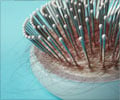What Causes Hair Loss
The cause of hair loss may vary from a local condition affecting the scalp to an ailment affecting the whole body.
The common causes of hair loss are listed below:
Androgenetic Alopecia: Androgenetic
Telogen Effluvium: Telogen effluvium is a condition where the normal balance between the resting and growth phases of hair is disrupted, resulting in a predominant telogen phase. Thus, it leads to excessive shedding of hair and a decrease in the total number of hair. Some of the conditions that can result in telogen effluvium are:
- Physiological stress like surgery, severe illness, emotional crisis or pregnancy.
- Medical condition: Medical conditions that can cause hair loss include:
- Hypothyroidism and hyperthyroidism
- Systemic amyloidosis
- Liver or kidney failure
- Inflammatory bowel disease
- Lymphoproliferative disorders
- Autoimmune diseases like systemic lupus erythematosus and dermatomyositis
- Chronic infections like HIV and secondary syphilis
- Inflammatory disorders like psoriasis, seborrheic dermatitis and allergic contact dermatitis
- Nutritional factors: Nutritional factors that can cause hair loss include:
- Zinc deficiency
- Iron deficiency
- Severe decrease in protein, fatty acid and calorie intake due to starvation or dieting
- Malabsorption syndromes and pancreatic disease
- Vitamin D deficiency
- Medications: Medications that can cause telogen effluvium are oral contraceptives, androgens, retinoids, beta-blockers, angiotensin-converting enzyme inhibitors, anticonvulsants, antidepressants, and anticoagulants.
The event may have occurred up to 3 months before the hair loss incident. Treatment of the underlying condition usually results in resolution of the hair loss. Thus, telogen effluvium is a sign of an underlying condition and not a disease by itself.
Alopecia Areata: Alopecia areata is a condition where the patient suffers from a localized hair loss. When the hair loss extends to the whole scalp, the condition is called alopecia totalis. If it is accompanied by hair loss over the entire body, it is called alopecia universalis. The hairs over the affected area resemble exclamation points, that is, the hair is thinned out but the caliber of the hair at the base remains the same. It may be associated with autoimmune conditions. Most patients recover without treatment in 6 to 12 months. Recurrence occurs in 30% cases. Prognosis is worse if the condition lasts for more than a year, if it worsens, begins before puberty, is present in other members of the family or in patients of Down’s syndrome.
Anagen Effluvium: Loss of hair in the anagen phase occurs due to chemotherapy, radiotherapy (radiotherapy can also cause telogen effluvium), heavy metal poisoning and boric acid poisoning.
Trichotillomania: Trichotillomania is a psychiatric condition where the patient plucks out his or her own hair. It may develop between 8 to 12 years of age. The hair loss appears bizarre, with incomplete areas of clearing. In some cases, the patient may also eat up the plucked hair resulting in obstruction in the intestines.
Traction alopecia: Traction alopecia is a condition where the person suffers from hair loss due to tight tying of hair in ponytails or plaits. A change in hair style is necessary to prevent further hair loss in these patients.
Tinea capitis: Tinea capitis is ringworm infection of the scalp. It is a type of fungal infection where there may be a boggy lesion on the scalp over which the hair are increasingly fragile and breaks easily.
Cicatricial alopecia: Cicatricial alopecia is a condition where the hair follicles are permanently destroyed, resulting in permanent hair loss. It could be caused by a number of conditions like inflammation, autoimmune conditions like discoid lupus and infections like cellulitis.







